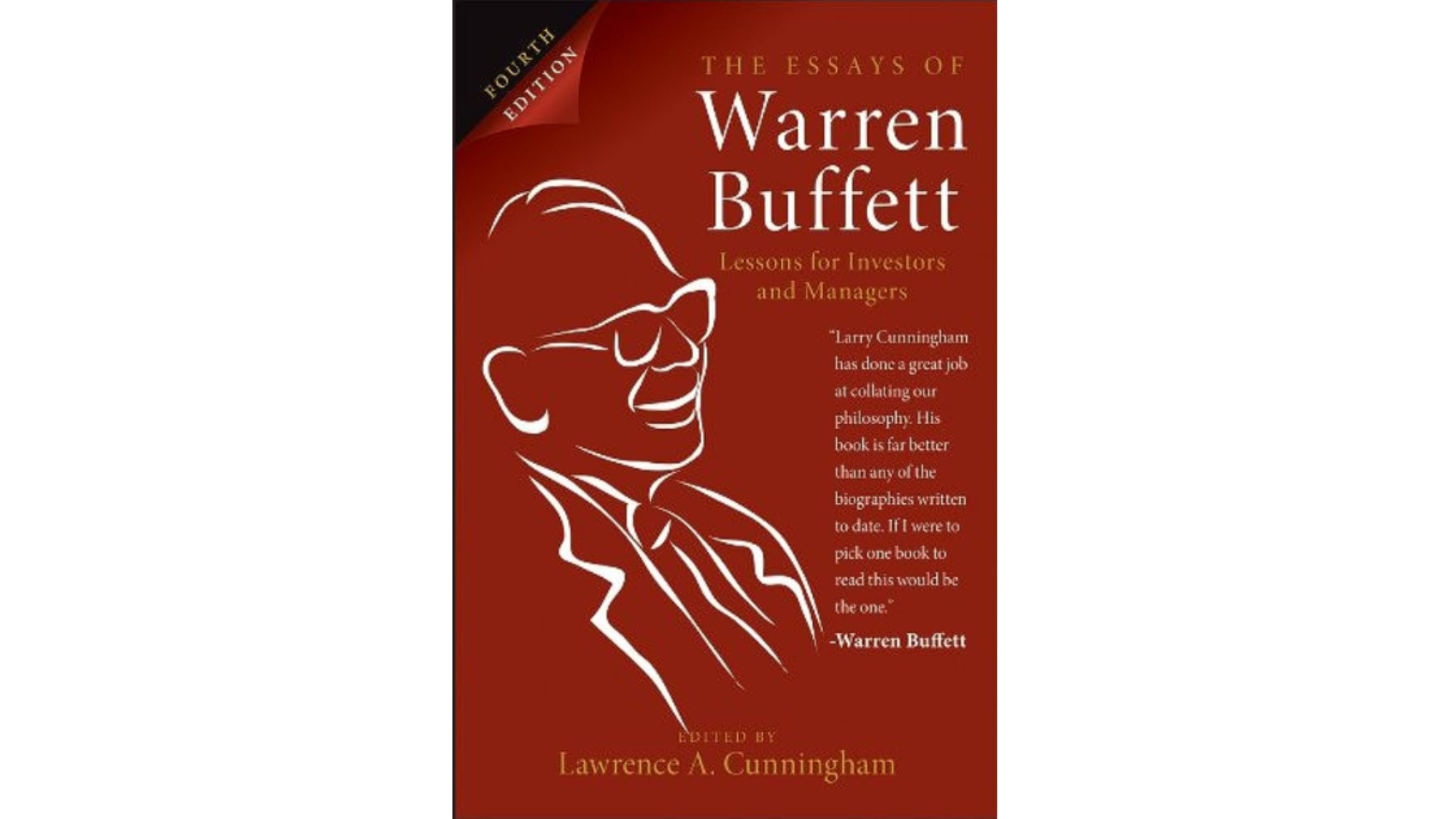The book “The Essays of Warren Buffett: Lessons for Investors and Managers” is a thorough collection of Buffett’s letters to Berkshire Hathaway shareholders as well as several articles he has written on management and investment strategies. These writings are collected by Lawrence A. Cunningham, who also organizes them thematically and adds commentary to help the reader comprehend
Buffett’s perspectives on value investing, his method of financial analysis, the value of shareholder communication, corporate governance, and the function of managers in successfully managing organizations are just a few of the many themes covered in the book. Through his works, Warren Buffett imparts the knowledge, insight, and lessons he has gained over the course of his prosperous career as an investor and company executive.
Readers have the chance to learn more about Buffett’s investment philosophy, his emphasis on long-term thinking, the standards he uses to evaluate firms, and his general approach to successful investing through the essays and letters in the book. With reference to Buffett’s broad experience and track record, the book seeks to provide insightful lessons and helpful advice to both investors and management.
It’s vital to highlight that Lawrence A. Cunningham’s function in the book is primarily that of editor and compiler because it contains Buffett’s original writings. Readers can understand Buffett’s philosophy and take away his investment and management concepts by reading his own words.
The Book in 3 Sentences
1. Compilation of Warren Buffett’s writings: The book gathers Warren Buffett’s letters to Berkshire Hathaway shareholders and various essays he has written over the years. It provides readers with a comprehensive collection of Buffett’s original writings on investment principles and management practices.
2. Wide range of topics covered: The book covers diverse topics, including value investing, financial analysis, shareholder communication, corporate governance, and effective management. It offers readers insights into Buffett’s investment philosophy and provides practical guidance for investors and managers alike.
3. Lessons from Buffett’s experiences: Through his writings, Buffett shares the wisdom and lessons he has gained from his successful investment career. The book aims to provide readers with valuable insights, enabling them to learn from Buffett’s experiences and apply his principles to their own investment and managerial endeavors.
Impressions
“The Essays of Warren Buffett: Lessons for Investors and Managers” by Lawrence A. Cunningham, here are some common impressions readers have had:
1. Valuable insights from Warren Buffett: Readers often find the book to be a treasure trove of wisdom and insights from Warren Buffett, one of the most successful investors in history. They appreciate the opportunity to gain a deeper understanding of Buffett’s investment philosophy and learn directly from his experiences and teachings.
2. Practical guidance for investors and managers: The book is often praised for its practicality, providing actionable advice and guidance for investors and managers. Readers appreciate the application of Buffett’s principles to real-world scenarios, helping them make better investment decisions and improve their managerial practices.
3. Clarity and accessibility: Cunningham’s editing and organization of Buffett’s writings are often commended for making the content accessible to readers of varying backgrounds. The book is perceived as being easy to read and understand, even for those without extensive knowledge of finance or investing.
4. Long-term focus and value investing: Readers often highlight the emphasis on long-term thinking and value investing principles found in the book. Buffett’s dedication to seeking undervalued assets, his patient approach to investing, and his focus on intrinsic value resonate with readers and influence their own investment strategies.
5. Insights into Berkshire Hathaway’s success: As the book includes Buffett’s letters to shareholders, readers gain insights into the growth and success of Berkshire Hathaway as a company. This provides a unique perspective on the development of one of the most renowned conglomerates and the factors that contributed to its achievements.
How I Discovered It
“The Essays of Warren Buffett: Lessons for Investors and Managers” by Lawrence A. Cunningham has gained popularity and visibility through various channels. I read this book as I wanted to understand what can be learned from the legendary investor.
Who Should Read It?
“The Essays of Warren Buffett: Lessons for Investors and Managers” by Lawrence A. Cunningham is recommended for a wide range of individuals interested in investing, finance, and learning from Warren Buffett’s insights. Here are some groups of people who can benefit from reading this book:
1. Aspiring investors: Individuals who are new to investing or seeking to enhance their investment knowledge can gain valuable insights from this book. It offers lessons and principles directly from Warren Buffett, providing a foundation for understanding successful investing strategies.
2. Business managers and executives: The book’s focus on lessons for managers makes it relevant for individuals involved in business management and leadership roles. It offers insights into Buffett’s management practices and approaches to corporate governance, providing guidance on effective decision-making and creating shareholder value.
3. Finance and business students: Students pursuing studies in finance, business, or related fields can benefit from reading this book. It offers real-world perspectives on investing, corporate governance, and managerial decision-making, providing practical knowledge that complements academic learning.
4. Buffett enthusiasts: Individuals with a particular interest in Warren Buffett, his investment philosophy, and his success as an investor will find this book compelling. It allows them to delve deeper into his writings and gain a more comprehensive understanding of his approach to investing and management.
How the Book Changed Me
After reading “The Essays of Warren Buffett: Lessons for Investors and Managers” by Lawrence A. Cunningham and gaining insights from Warren Buffett’s writings, individuals may experience several changes in their thinking and approach, follwing is how it changed me:
1. Shift in investment philosophy: I adopted a more value-focused and long-term investment philosophy. I prioritized analyzing a company’s intrinsic value, seeking undervalued opportunities, and considering the long-term potential of investments rather than chasing short-term gains.
2. Focus on fundamental analysis: The book emphasizes the importance of conducting thorough research and analysis before making investment decisions. I developed a habit of digging deeper into financial statements, understanding a company’s competitive advantage, and considering the underlying fundamentals when evaluating investment opportunities.
3. Patience and discipline: Warren Buffett’s emphasis on patience and discipline influenced me to adopt a more patient and disciplined approach to investing. I resist the urge to make impulsive decisions based on short-term market fluctuations and focus on long-term value creation instead.
4. Emphasis on risk management: The book highlights the significance of risk management and capital preservation. I become more mindful of the risks associated with investments, implement risk mitigation strategies such as diversification, and pay attention to the downside protection while seeking potential returns.
5. Continuous learning and improvement: Warren Buffett’s commitment to continuous learning and improvement is a recurring theme in his writings. I adopted a similar mindset, striving to enhance my investment knowledge, staying updated with market trends, and seeking opportunities for personal and professional growth.
My Top Quotes
1. “Price is what you pay. Value is what you get.” This quote emphasizes the importance of distinguishing between the price and intrinsic value of an investment, highlighting the need to focus on underlying value rather than short-term market fluctuations.
2. “Be fearful when others are greedy and greedy when others are fearful.” Buffett encourages contrarian thinking and taking advantage of market opportunities when investor sentiment is overly optimistic or pessimistic.
3. “It’s far better to buy a wonderful company at a fair price than a fair company at a wonderful price.” This quote emphasizes the importance of investing in high-quality companies with strong competitive advantages, even if they are not available at deeply discounted prices.
4. “Risk comes from not knowing what you’re doing.” Buffett emphasizes the importance of understanding the businesses and industries in which one invests and taking calculated risks based on knowledge and analysis.
5. “Our favorite holding period is forever.” This quote reflects Buffett’s long-term investment approach, focusing on owning businesses for the long haul rather than engaging in frequent trading or speculation.
These quotes capture some of the key principles of Warren Buffett’s investment philosophy. While they may not be specific to “The Essays of Warren Buffett: Lessons for Investors and Managers,” they reflect his overall approach to investing and provide valuable insights into his thinking.
Detailed Notes//Key Topics
While I don’t have access to the specific content of “The Essays of Warren Buffett: Lessons for Investors and Managers” by Lawrence A. Cunningham, I can provide you with some key topics that are commonly covered in books and writings related to Warren Buffett and his investment philosophy. These topics are often relevant to understanding Buffett’s approach to investing and management:
1. Value investing: Warren Buffett is known for his adherence to the principles of value investing. This approach involves identifying undervalued assets or companies and investing in them with a long-term perspective.
2. Financial analysis: Buffett emphasizes the importance of thorough financial analysis in assessing investment opportunities. This includes analyzing financial statements, understanding a company’s competitive position, evaluating its management team, and considering its growth prospects.
3. Moats and competitive advantage: Buffett often discusses the concept of an economic moat, which refers to a sustainable competitive advantage that allows a company to maintain its profitability and fend off competition. Identifying and investing in companies with strong moats is a key aspect of his investment strategy.
4. Long-term thinking: Buffett is known for his long-term investment horizon. He encourages investors to focus on the intrinsic value of a business and its potential for long-term growth, rather than being swayed by short-term market fluctuations.
5. Shareholder communication and corporate governance: Buffett emphasizes the importance of transparent and effective communication with shareholders. He advocates for strong corporate governance practices and aligning the interests of management with those of shareholders.
6. Risk management and capital allocation: Buffett is mindful of risk management and the importance of preserving capital. He emphasizes the need to assess and manage risks in investment decisions, as well as the efficient allocation of capital to maximize returns.
7. Lessons from Berkshire Hathaway: As the chairman and CEO of Berkshire Hathaway, Buffett’s investment conglomerate, the book may delve into the lessons learned from the growth and success of the company. This can include insights into its acquisition strategy, portfolio management, and the evolution of Berkshire Hathaway’s business operations.
While these topics provide a broad overview, it’s important to note that the specific topics covered in “The Essays of Warren Buffett” may vary. Reading the book will provide a more comprehensive understanding of the specific topics and lessons presented by Buffett himself.

